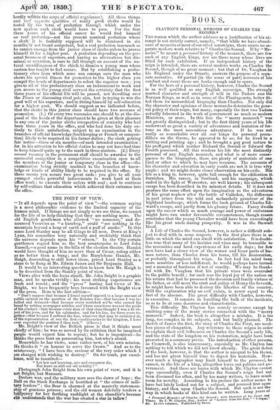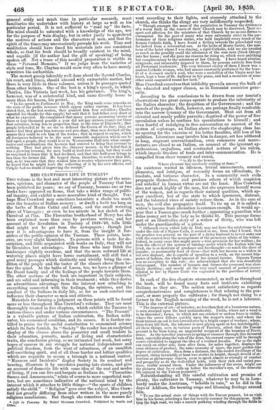BOOKS.
CLAYTON'S PERSONAL MEMOIRS OF CHARLES THE
SECOND.*
Tin reason which the anther adduces as a justification of his at-. tempt is not strictly correct, namely, " that while we have abund- ance of memoirs of most of our other sovereigns, there exists no se- parate modern work relative to " Charles the Second. If by " Me- moirs " be meant a personal history of the monarch, there are few such of any English kings, nor are there ninny whose lives are fitted for such exhibition. If an independent history of the reign is intended, there are several modern works on Charles the Second, though of no great moment ; but that of Dr. Vaughanin his England under the Stuarts, answers the purpose of a sepa- rate narrative. Of partial (in the sense of part) accounts of his conduct and court there are books enough and to spare. For the hero of a personal history, however, Charles the Second is as well qualified as any English sovereign. The strongly marked character and strength of will in the Tudors and the Norman Kings, as well as in some of the Plantagenets, better fit- ted them for monarchical biography than Charles. Not only did. the character and opinions of those monarchs determine the gene- ral policy of their reign, but many, especially the first two Tudors actually laboured in the work of government as much as modern Ministers, or more. In this line the " merry monarch" was.. not greatly distinguished ; but in the first thirty years of his life underwent as great a variety of adventures and mutation of for- tune as the most necessitous adventurer. If he was not really as remarkable over all our kings for personal peooa- dilloes on the throne, he appeared to be so; for he lived in a writing and printing age ; and he brought a gay good nature to his prolLgacy which neither Richard the Second or Edward the- Fourth possessed. All this renders his life the most distinctly , personal of any English monarch, and what is of more conse- quence to the biographer, there are plenty of materials of one kind or other to which he may have recourse. The accounts of his character and education in early youth are not it is true very ample ; and we might desire closer observation on his exile. His life as a king is, however, quite full enough for the edification it. furnishes. His career, in Scotland, and his campaign, which. ended in the fight of Worcester, are well known ; his subsequent escape has been described in its minutest details. If it does not produce the same effect upon the imagination as the adventures of his great nephew after the battle of Culloden, the difference• in part arises from the wild and melancholy grandeur of the highland landscape, which forms the back ground of Charles Ed- ward's escape, and partly from his gloomy future. Fancy dwells upon the career which so much courage and power of enduranee might have run under favourable circumstances, though reason concludes that the young Chevalier would have been exceedingly like his great uncle during prosperity. It was in the Stewart blood.
A Life of Charles the Second, however, is rather a difficult sub- ject to deal with in some respects. In the first place there is so. little on which the mind can dwell with satisfaction. It is doubt- less true that many of his laxities and vices may be traceable to- the necessities and hard experiences of his early days ; for few men have had a closer view of the worser and baser parts of his- man nature, than Charles from his teens, till his Restoration, or probably throughout his reign. In fact had his mind been- more sensitive or less indifferent, he would perhaps have turned out a monster of hardness if not of cruelty. We may be thank- ful with Dr. Vaughan that his private vices were overruled to the public benefit ; for such was the loyal joy of the nation on his return that had he possessed the decorum and family virtues of his father, or still more the craft and policy of Henry the Seventh,. he might have been able to destroy the liberties of the country. Still the explanation why an evil exists, is never equal to the fact of its absence. The great difficulty with Charles, however, is executive. It consists in handling the bulk of the incidents, so as to be at once &corona and characteristic.
This difficulty Mr. Clayton has sanely overcome except by omitting some of the many stories connected with the "merry monarch." Indeed, the book is altogether a mistake. It is too long, too complex in its subjects, and but badly planned. The sketch of James the first, the story of Charles the First, are need- less pieces of elongation. Any reference to those reigns in order to explain their evil influences on Charles the Second's early life,. and the state of the kingdom on his restoration, might have been presented in a summary précis. The introduction of other persons, as Cromwell, is also unnecessary, especially as Mr. Clayton has nothing to tell which we did not know already. The great defect of the book, however, is that the author is unequal to his theme, and has not given himself time to digest his materials. How- ever much a biographer may limit himself to the personal, he cannot, in the life of a king, altogether leave out politics and go- vernment. And these are topics with which Mr. Clayton cannot cope successfully, even if Charles the Second's reign had not been discussed too often, and by too many writers, to leave much room for novelty. According to his preface the author .seems to have but lately looked out for a subject, and pounced brat upon history, and then upon Charles the Second. But such 18 not th■ way in which books of this kind can be written. Long years of • Personal Memoirs of Charles the &cora with Sketch" °I: 12.14, .P6rurtbiq azt ikeTira. "In tBwyojvol. MrtuneC81:t yrtoullb.li.Eshqe.d, Author ofLetters limo the Nile, general study and much- time in particular research, must familiarize the undertaker with history at large as well as his particular period. It is not sufficient to "read up" the facts. His mind should be saturated with a knowledge of the age, not for the purpose of fain display, but in order justly to apprehend the motives of actions and the characters of men, and that the spirit of the times may.unconsciously pervade his work. Time and meditation should have fused his materials into one consistent whole, so that his book should be broadly existent in the mind, and capable if the author had the gift of speaking) of being spoken off. Not a trace of this needful preparation is visible in these "Personal Memoirs." If we judge from the varieties of style and tone, Mr. Clayton would seem very often to have merely rewritten his authorities.
The merest gossip tolerably well done about the Second Charles, his court, and times, should abound with extractable matter, but there is very little in these volumes, unless it be passa•°es quoted from other writers. One of the best is a king's speech, iu which Charles, like Victoria last week, has his grievance. The king's, however, was of a substantial kind, and came directly home to more than his bosom, his pocket. " In his speech to Parliament in May, the King made some remarks on the state of the public revenue which appear rather curious. It has been stated that, in the last session, they granted him four subsidies ; Charles repeated his thanks for this supply, but said that it had fallen very short of what he expected. He complained that many persons possessing estates of three or four thousand pounds a year did not pay sixteen pounds for these four subsidies, being less in proportion than in the time of Elizabeth ; that people believed it to be no sin to defraud the Crown of its due ; that, no sooner had they given him tonnage and poundage, than men devised all the means they could to rob him of the duties ; that in regard to excise, -which all foreigners believed to be the most insensible imposition which can be laid upon a people, they would hear in Westminster Hall into what conspi- racies and combinations the brewers had entered to bring that revenue to nothing. They had given him the chimney money, in the belief that it was a growing revenue, for men build at least fast enough, but they would be surprised to learn that it had declined, and that this half-y.ear brings in less than the former did. He begged them, therefore, to review that Bill, and, as he was sure that they wished him to receive whatsoever they gave, he hoped that he might have the collecting of it by bis own officers, and Vieq,he had no doubt of improving the receipt."



























 Previous page
Previous page